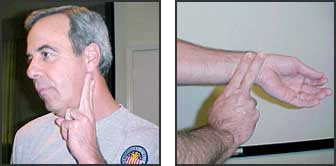4.3 Measuring your heart rate
The most common way of measuring heart rate is by feeling the pulse at one of the arteries. The pulse is quite literally that – a pulse of blood running through the artery each time the heart does one pumping motion.

Activity 4: Measuring your pulse: what you need to do
Can you measure your own pulse? The heart rate is measured in the number of heart beats per minute. First, find a watch or clock? You can use the clock that shows on the desktop of most computers. To use it, double-click on the clock to open it so that you can see the second hand. Now put your fingers on your wrist as shown in Figure 6. If you can feel your pulse there, count how many times the artery pulses for thirty seconds, then double this number to find your own heart rate.
Discussion
Some people have trouble finding the pulse in their wrist, so don’t worry if you can’t find it easily. Another simple place to feel the pulse is at the neck, as shown in the second photograph. If you can’t find the pulse at your wrist, try at the neck. You might have to push a little to feel it strongly, but you should be able to find it.
Ask someone else to check their pulse. How does your pulse compare to theirs?
The national average for heart rate should be about 75 beats per minute. How does your pulse compare with this? Don't worry if yours is different from the national average. Your heart rate might be higher or lower than this average because you have had a busy day, are sitting up, have just eaten, have a cold, are hot or a whole range of other reasons. Try taking it again perhaps first thing in the morning before you get up. If you are concerned about your heart rate, you should seek medical advice.
